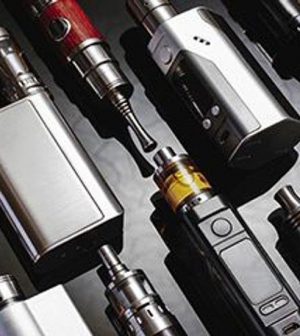- Could Your Grocery Store Meat Be Causing Recurring UTIs?
- Are You Making This Expensive Thermostat Error This Winter?
- Recognizing the Signs of Hypothyroidism
- 10 Strategies to Overcome Insomnia
- Could Artificial Sweeteners Be Aging the Brain Faster?
- Techniques for Soothing Your Nervous System
- Does the Water in Your House Smell Funny? Here’s Why
- Can a Daily Dose of Apple Cider Vinegar Actually Aid Weight Loss?
- 6 Health Beverages That Can Actually Spike Your Blood Sugar
- Treatment Options for Social Anxiety Disorder
E-Coupons Are Luring Folks to Taking Up Vaping

Coupons for e-cigarettes appear to be a powerful way to get people hooked on vaping, a new study shows.
People who receive coupons for e-cigarettes are 50% more likely to begin vaping, and less likely to quit once they’ve started, according to findings published recently in the American Journal of Preventive Medicine.
“Our study found that when people were exposed to more waves of e-cigarette coupon advertising, they were more likely to initiate e-cigarette use and it was more challenging for them to quit,” said researcher Zongshuan Duan, an assistant professor of population health sciences at Georgia State University.
“The effect sizes were actually quite large and meaningful, given the number of people who might be exposed to this marketing strategy,” Duan said in a university news release.
For the study, Duan and colleagues analyzed data from nearly 20,000 American adults spanning a four-year period.
Previous studies had found that promotional coupons, either through direct mail or e-mail, encourage and sustain smoking behaviors, researchers said.
The new study found that people’s likelihood of using e-cigarettes rose as their exposure to coupons increased.
People who never used e-cigarettes before were 50% more likely to start using them after getting coupons, results show.
Meanwhile, former vapers were 40% more likely to relapse and current users were 30% more likely to continue using, compared to people who didn’t receive the coupons.
The researchers noted there’s substantial evidence that people who vape nicotine products are more likely to take up tobacco smoking.
Given the findings, Duan said policies are needed to restrict the distribution and redemption of tobacco coupons. He noted that in 2020, New York and New Jersey implemented laws prohibiting such coupons.
More information
The Cleveland Clinic has more about vaping.
SOURCE: Georgia State University, news release, Jan. 30, 2024
Source: HealthDay
Copyright © 2026 HealthDay. All rights reserved.










